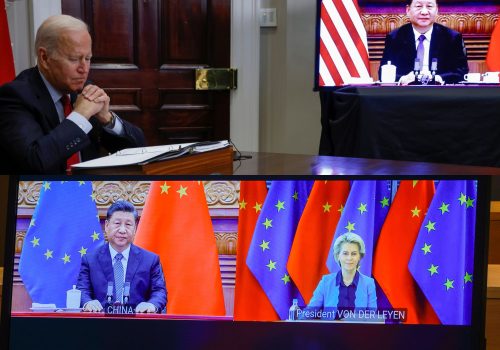A new US-China agreement giving American financial regulators greater access to the books of Wall Street-listed Chinese companies represents significant progress in a decade-long auditing dispute that threatened to disrupt US-China financial-market ties. But it’s unlikely to herald a return to business as usual, when huge share issues drove Chinese stocks to sky-high valuations.
Instead, the August 26 accord may mark the beginning of a new normal in which the biggest Chinese corporations decamp from Wall Street to Hong Kong while new Chinese listings in New York slow to a trickle.
The agreement targeted Beijing’s refusal to allow US access to the paperwork of the accounting firms that audit listed Chinese companies. Such inspections are mandated by US law and accepted by all other governments whose companies list on Wall Street. Under last week’s agreement, the paperwork is to be made available to US inspectors in Hong Kong. Without that solution, Beijing was facing the mandatory delisting of Chinese companies in 2024. But the agreement does not mean the issue has been fully resolved. Securities and Exchange Commission (SEC) Chairman Gary Gensler has stated several times—including in the announcement of the accord—that “the proof will be in the pudding.”
Only China’s compliance with the terms of the agreement will forestall a worst-case scenario: the mass delisting of more than 250 Chinese companies.
Either way, it appears to be the end of an era in which many Chinese companies enjoyed largely unfettered access to US equity markets while US investors were able to broaden their exposure to what, until recently, was the world’s most dynamic economy. It will also add to the forces steadily driving the US and Chinese economies apart.
Cease and delist
The process of separating corporate China from Wall Street began during the Trump administration, when US regulators ordered the delisting of three Chinese telecommunications companies as part of an effort to restrict investments in companies deemed threatening to US national security. Delisting gathered momentum earlier this month as five Chinese state-owned enterprises—including three of the world’s largest energy companies—announced that they would leave US markets. The move signaled that China was prepared to reach the audit agreement, although it didn’t want to give the United States access to the books of important state companies.
But the pressure has also come from inside China. A crackdown on alleged violations of corporate governance that began in late 2020, which has only eased in recent months, hit some of China’s most successful corporations, particularly e-commerce companies. These include Nasdaq-listed Alibaba Group, Tencent Holdings (traded over-the-counter in New York), and the ride-hailing company Didi Chuxing Technology Co., which Beijing forced to delist from the New York Stock Exchange right after its June 2021 initial public offering (IPO). Didi was accused of ignoring government concerns about cybersecurity issues.
The crackdown has been codified in various regulations and laws, most recently the Cybersecurity Law implemented in February, which introduced the strict regulation of cross-border business and financial market activities. It specifically mandates a review by Chinese government officials of all data controlled by internet companies with more than one million users before an overseas listing can proceed.
When combined with the damage from widespread COVID-19 lockdowns in major Chinese cities and a spreading crisis in China’s property sector, the pressure on the tech sector caused a sharp economic downturn this year. That, in turn, hit China’s financial markets and added to the disenchantment of American investors with Chinese stocks. Companies listed on the Nasdaq exchange, for example, saw their share prices plummet by more than 60 percent from all-time highs in February 2021 as the audit dispute and concerns about the negative news from China took hold.
Ironically, China’s economic and financial-markets performance probably gave Chinese regulators more leverage in Beijing as they negotiated the audit agreement with the United States. Losing access to a source of capital in New York clearly appeared more daunting than when China was riding high. The added shock of failed talks would have been another self-inflicted wound for Beijing’s beleaguered policymakers. Thus the undoubtedly bitter decision to agree to the SEC’s demands.
A haven in Hong Kong?
Some observers predict the audit agreement—the terms of which are mostly undisclosed—may contain the seeds of its own failure. For example, analysis of the two governments’ announcements of the accord suggest differing interpretations of its key point about how much autonomy the US Public Company Accounting Oversight Board (PCAOB), which is responsible for auditing listed companies’ financial statements, enjoys in its inspections. Goldman Sachs says the market is pricing in a probability of “around 50 percent” that Chinese companies will be delisted, down from 95 percent earlier this year.
Small wonder, then, that several large Chinese companies, led by Alibaba and online retailer JD.com, are establishing dual primary listings in Hong Kong. That action would facilitate smooth delisting from Wall Street should that eventuality occur—and for the first time enable Chinese retail investors to buy those stocks via trading links with the Chinese mainland.
It also would fit with the long-term strategy of the Chinese government to use the Hong Kong Stock Exchange as an alternative venue for overseas listings. China’s media already has taken to calling the Hong Kong listings a “golden parachute” for Chinese companies listed on Wall Street.
If China’s cybersecurity watchdog decides that the vast troves of data held by companies like Alibaba are too sensitive (even if PCAOB bookkeepers can’t access them), then some of those companies are expected to leave New York and move to Hong Kong. That’s why it’s noteworthy that Morgan Stanley last year started tracking the performance of several Chinese internet stocks in Hong Kong—instead of New York—in calculating its market indices, a move that led several US institutional investors to shift their holdings of those shares away from the US markets.
Meanwhile, there has been only one IPO of Chinese stocks on Wall Street this year valued above one billion dollars. By comparison, there have been five on mainland Chinese exchanges, which have seen a record $58 billion of IPOs this year despite the overall weak market performance. The most recent Chinese IPO in the United States raised about $25 million.
For the moment, retaining a foothold on Wall Street remains Beijing’s immediate priority as it seeks to head off a deeper economic downturn. But in the long run, its interest lies in boosting the global standing of China’s financial markets—and that portends a continued loosening of the market ties that once were expected to inextricably bind the US and Chinese economies.
Jeremy Mark is a senior fellow with the Atlantic Council‘s Geoeconomics Center. He previously worked for the International Monetary Fund and the Asian Wall Street Journal. Follow him on Twitter: @JedMark888.
Further reading
Wed, Aug 3, 2022
The coming aftershocks from Pelosi’s Taiwan trip
Fast Thinking By
With Pelosi now wheels-up from Taipei, what’s coming next in the US-China showdown? And how will the trip shake up life in Taiwan?
Thu, Jul 28, 2022
Cooperation with China: Challenges and opportunities
Report By Michael Schuman, David O. Shullman
Cooperation with China should focus on areas where our interests still align and where we can keep Beijing grounded in the international system. Like-minded allies and partners must pair such efforts with commitments to defend against China’s violations of international norms, impose costs on irresponsible behavior, and strengthen themselves and current global institutions to compete effectively and uphold liberal values.
Thu, Jun 30, 2022
Why Russia’s economy is more resilient than you might think
New Atlanticist By Josh Lipsky
With each recession, Russian institutions—and the population itself—have become increasingly inured to economic trauma.
Image: French tourists sit in front of the New York Stock Exchange on August 12, 2022. Photo by Anthony Behar/Sipa USA/REUTERS



